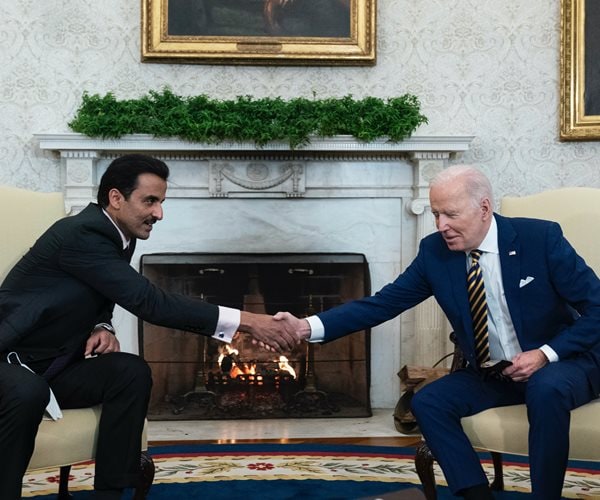The emir of Qatar on Wednesday made an urgent appeal to Russia and the West, saying his nation will not be able to re-supply Europe with enough liquefied natural gas to stave off an energy crisis this winter, and urged both parties to bring a speedy end to the war.
In an exclusive interview with French news outlet Le Point, Sheikh Tamim bin Hamad Al Thani emphasized that although gas and oil supply chains struggled before the Kremlin’s invasion in February, the war has taken a severe toll on the industry.
“We want to help Europe, and we will supply gas to Europe in the coming years. But it is not true that we can replace Russian gas,” Sheikh Tamim said. “Russian gas is essential to the global market.”
While Qatar has one of the world’s largest reserves of natural gas, Tamim said China and Asian markets account for most of his nation’s contracted supply of LNG (liquified natural gas).
“We must be careful about the types of sanctions that complicate things for the entire world,” he said, declining to say whether he supported the sanctions.
Instead, Tamim called for an end to the conflict.
“The most important thing is that we are all suffering from the situation, whether in terms of energy or food. That’s why we need to end this war in Ukraine,” he told Le Point.
From Ukraine to Mideast
Among other matters, the emir offered vital insight into Qatar’s relationship with the Middle East’s two most influential powers — Iran and Saudi Arabia — relationships which, historically, have been difficult.
Qatar was blockaded by Saudi Arabia for five years between 2017 and 2021. Multiple alleged attempts at regime change in the country instigated by the Saudis have also sparked serious tensions.
Still, the leader appeared willing to turn over a new leaf with Saudi Arabia, stating that he “doesn’t want to talk about the past” but instead “look to the future” with the support of the GCC, or Gulf Cooperation Council, an organization representing the eight monarchies of the Arabian peninsula.
“We have entered a new phase. Things are moving in the right direction. We recognize that sometimes, we disagree. We are preparing for the future of this group of countries, the [GCC], which is essential for unlocking the potential of young people throughout the region,” Tamim proclaimed.
A small gulf state, Qatar has become a powerful player in the region because of its enormous wealth and its role playing intermediary and peacemaker in multiple conflicts.
Doha’s role in helping the U.S. deal with the Taliban to facilitate a withdrawal from Afghanistan, as well as serving as a hub for Afghan refugees, has earned Qatar high praise in Washington.
This past March, President Biden, saying it had been “long overdue,” designated Qatar a major non-NATO ally, joining Kuwait and Bahrain which hold such status.
Still, Qatar has been criticized for ties to both Iran and the Muslim Brotherhood, concerns that have drawn hostility from several of its GCC neighbors included the UAE and Saudi Arabia.
Questioned about the issue, Tamim noted that “Iran is very important to us,” adding “we share our main gas field” with them.
He said his posture is focused on dialogue rather than confrontation with his neighbor.
“We encourage all GCC member states and Iran to talk to each other. Of course, there are differences, everyone has some, but we must sit down and talk about them,” he said.
The emir also denied any connection with the Muslim Brotherhood.
“There are no such links,” he told Le Point. “There are no active members of the Muslim Brotherhood or related organizations here in Qatar.”
Reforms
In the wake of Qatar hosting the World Cup this year, Tamim addressed recent reports of troubling conditions for migrant workers.
He acknowledged that some of the claims were correct and offered assurances that his government was investigating cases and even changing laws as necessary.
“We realized that we had a problem with work on construction sites, and we took strong measures in record time. We changed the law and punished anyone who mistreats an employee. We’ve opened our doors to NGOs [non-governmental organizations], and we cooperate with them. We are proud of that,” he said.
But he also took issue with a second type of criticism leveled at his nation, more general in nature.
He told Le Pointe that Qatar, for example, has long welcomed Christians and allowed them to worship.
“They have the right to practice their religion,” he said. “They helped us build this country.”
He described Qatar as “diverse,” modern and open to many cultures, while touting that women hold equal status in society.
“The role of women is vital in our society,” Tamim said, reporting that women dominate Qatari universities and make up half their workforce while holding top positions.
“We even have women pilots in our Air Force,” he boasted.
Tamim said he is not concerned that others will criticize his nation.
“These are people who do not accept that an Arab Muslim country like Qatar is hosting the World Cup. They will find any excuse to denigrate us,” he claimed.

